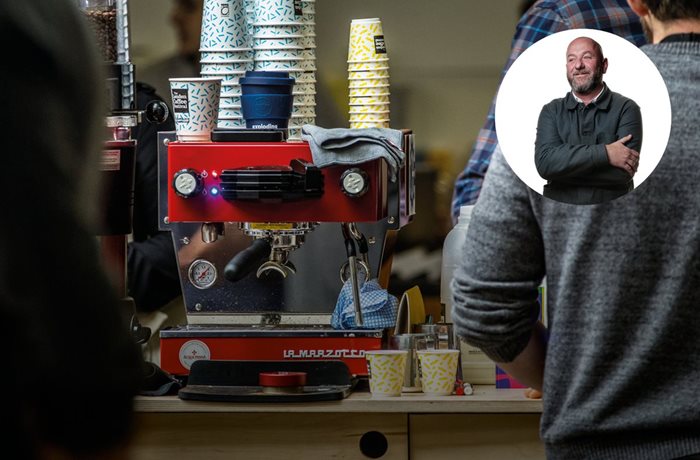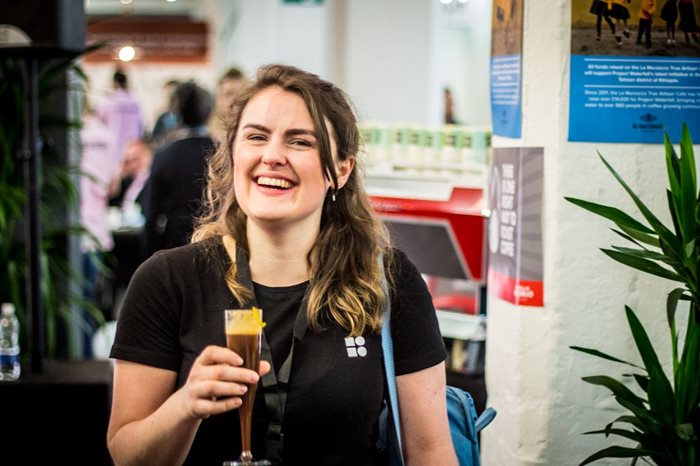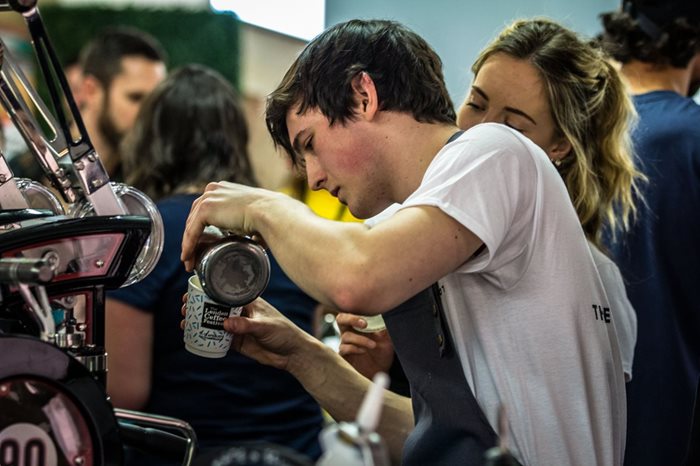Ten years ago, La Marzocco launched a pop-up café concept at a brand-new event called The London Coffee Festival. Since then, The True Artisan Café has become a firm festival highlight and one of the busiest zones at the Old Truman Brewery. 5THWAVE caught up with La Marzocco UK & Ireland General Manager Paul Kelly to discuss the remarkable ascendence of the UK coffee scene and how it continues to capture the hearts and minds of the British public

Main image: The iconic Linea Mini at the London Coffee Festival | Inset: Paul Kelly, General Manager, La Marzocco UK & I | All photos courtesy of La Marzocco
Making its debut at the first ever London Coffee Festival back in 2011, La Marzocco’s The True Artisan Café was designed to celebrate the visionaries and pioneers of the independent coffee community.
Pairing esteemed roasters and cafés in an interactive setting, the concept has given countless consumers their first taste of artisan innovations including cold brew, nitro – and of course – the now legendary espresso martini.
Specialty coffee terms such as single origin and roasting profiles are becoming increasingly common fixtures in the UK’s coffee lexicon – testament to the hard work of the industry in championing the value of artisan coffee and boutique café spaces.
A longstanding member of the UK coffee industry, La Marzocco UK & Ireland General Manager Paul Kelly has enjoyed a front seat at the development of UK coffee culture, which has changed beyond recognition since his early days working in the foodservice industry.
“There wasn’t really a coffee culture in the UK back in the early 2000s, but you could see the change coming,” he tells 5THWAVE.
"The passion that is put into the delivery of a coffee or cocktail is remarkable”
Recalling the wave of Australian and New Zealand coffee talent that jumpstarted the UK’s specialty coffee scene, Kelly says these young entrepreneurs were among the first to foster respect for coffee as an artisan product. In doing so, they spurred a newfound appreciation for coffee among the UK public, making it possible for a new wave of coffee shops and roasteries to flourish.
“Many of these cafés had a very basic aesthetic when they first opened – a lot of pallets and coffee sacks – because all their money went on quality equipment. That’s not to talk them down: they changed a lot of perceptions.”
Specialty coffee innovators such as Climpson & Sons, Nude Espresso, Allpress Espresso, Grind, and Ozone were all making their mark in the UK capital in the 2000s and 2010s. In particular, the rise of Shoreditch in East London as a hub of digital entrepreneurship provided the ideal incubator for UK coffee shop culture to develop and thrive.
“London embraced specialty coffee culture quite quickly,” recalls Kelly. “Shoreditch was turning into a media hub because of the dotcom boom and the rise of digital businesses in the area, which led to increased demand for coffee shops and bars.
“Many of these new businesses gave people their very first taste of the artisan coffee shop experience – then it spread out across the country."

Smiles all round. The True Artisan Café invites baristas to showcase their signature drunks and coffee cocktails
Enter the London Coffee Festival
With a critical mass of specialty coffee businesses now buzzing in the UK capital, in 2011 the very first London Coffee Festival was launched to catalyse growing consumer appetite for boutique café experiences and artisan beverages.
“It was the first event to have the vision to invite consumers to try new coffee experiences and that sparked a lot of interest and passion,” recalls Kelly.
From the outset, The True Artisan Café sought to provide a platform for roasters and cafés to showcase signature drinks, cocktails and food and test new innovations on an eager public. In doing so, the interactive format provided a vital boost for fledgling businesses to experiment and gain exposure.
“As it’s grown over the years, you now see roasters showcasing their café partners and vice versa, championing their beliefs and mission statements,” says Kelly.
“With its skill, quality and just a little bit of madness – DJs playing and cocktails flying around while baristas are working on the drinks – The London Coffee Festival has become a very energised event. The passion that is put into the delivery of a coffee or cocktail is remarkable.”
Bringing the café experience home
Like coffee events everywhere, The True Artisan Café has had to roll with the times when it comes to the challenges of the pandemic. Responding to the millions of consumers worldwide who forged new home coffee rituals during lockdowns, (and invested in increasingly sophisticated brewing equipment to boot), in 2020 La Marzocco launched The True Artisan Café: Home Edition.
“The growth of this industry has been phenomenal, but it has never lost its core values"
The refreshed competition format brought the renowned event platform directly into consumers’ homes, enabling them to maintain and make new connections with roasters and café partners during lockdown. In fact, as the pandemic brought much of the hospitality industry to a standstill, Kelly says increased at-home coffee consumption proved a lifeline.
“As an espresso machine manufacturer, we were blessed to have the Linear Mini during lockdown. There were very few commercial machines going out during the darkest days of Covid,” he says.
“When people invest in equipment and look for different coffee origins and roasters, that curiosity drives knowledge. That’s great for the whole industry because education drives growth,” he adds.
As the hospitality industry recovery gathers pace in the UK, Kelly believes the role of coffee shops as important community hubs has only strengthened during the pandemic and will be key to the future success of the industry.

Paul Kelly praises the coffee industry's sense of community and the passion, artistry and care that goes into every cup of coffee
“It’s really interesting that sustainability, mental health and staying local have all gained importance during Covid,” he says.
“Coffee shops have been so important for people to be able to manage the pandemic because they were local. The interaction could have just been speaking to a barista while ordering a latte, but that contact is vital for the many people who live alone.”
That sense of community, says Kelly, isn’t just great for coffee shop customers, but makes the industry an incredibly positive place to work, and one he’s proud to have contributed to.
“The growth of this industry has been phenomenal, but it has never lost its core values. The community, artistry and care that goes into every cup of coffee and every plate of food served – that’s what excites me.”
This article was first published in Issue 8 of 5THWAVE magazine.
Subscribe to 5THWAVE to receive each edition in print and digitally or sign up to our newsletter and be the first to read the latest articles and updates on World Coffee Portal research
